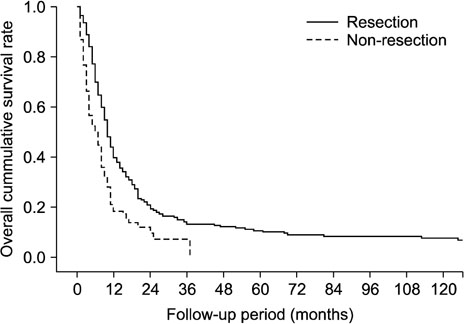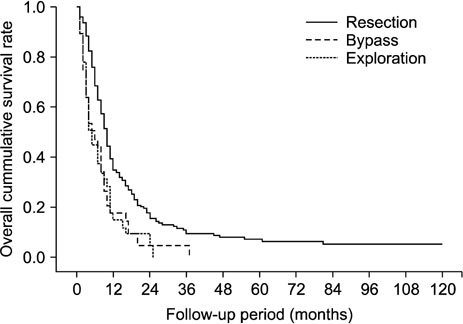Chonnam Med J.
2018 Jan;54(1):36-40. 10.4068/cmj.2018.54.1.36.
The Benefits of Resection for Gastric Carcinoma Patients with Non-curative Factors
- Affiliations
-
- 1Division of Gastroenterologic Surgery, Department of Surgery, Chonnam National University Medical School, Gwangju, Korea. dockim@chonnam.ac.kr
- 2Department of Pathology, Chonnam National University Medical School, Gwangju, Korea.
- KMID: 2458583
- DOI: http://doi.org/10.4068/cmj.2018.54.1.36
Abstract
- The benefits of resection for gastric carcinoma patients with non-curative factors remain controversial. Thus, we evaluated the survival benefits of resection in these gastric carcinoma patients. We reviewed the hospital records of 467 gastric carcinoma patients with non-curative factors who had resection (n=305) and compared their clinicopathological findings with individuals (n=162) who underwent bypass or exploration from 1996 to 2010. The 3-year survival rate of patients who had resection was higher than was that of patients who did not (13.2 vs. 7.2%, respectively p < 0.001). Cox's proportional hazard regression analysis revealed that only one factor was an independent, statistically significant prognostic parameter: the presence of peritoneal dissemination (risk ratio, 1.37; 95% confidence interval, 1.04-1.79; p < 0.05). The 3-year survival rate of patients with peritoneal dissemination was higher in individuals who underwent resection compared with those who did not (9.5 vs. 4.7%, respectively; p < 0.001). The current results highlight the improved survival rates of gastric carcinoma patients with non-curative factors who underwent surgery compared with those who did not. Although resection is not curative in this group of patients, we still recommend performing the procedure.
Keyword
Figure
Reference
-
1. Wu CW, Hsieh MC, Lo SS, Tsay SH, Li AF, Lui WY, et al. Prognostic indicators for survival after curative resection for patients with carcinoma of the stomach. Dig Dis Sci. 1997; 42:1265–1269.2. Hartgrink HH, Putter H, Klein Kranenbarg E, Bonenkamp JJ, van de Velde CJ. Dutch Gastric Cancer Group. Value of palliative resection in gastric cancer. Br J Surg. 2002; 89:1438–1443.
Article3. Saidi RF, ReMine SG, Dudrick PS, Hanna NN. Is there a role for palliative gastrectomy in patients with stage IV gastric cancer? World J Surg. 2006; 30:21–27.
Article4. Dittmar Y, Rauchfuss F, Goetz M, Jandt K, Scheuerlein H, Heise M, et al. Non-curative gastric resection for patients with stage 4 gastric cancer--a single center experience and current review of literature. Langenbecks Arch Surg. 2012; 397:745–753.
Article5. Kulig P, Sierzega M, Kowalczyk T, Kolodziejczyk P, Kulig J. Non-curative gastrectomy for metastatic gastric cancer: rationale and long-term outcome in multicenter settings. Eur J Surg Oncol. 2012; 38:490–496.
Article6. Li C, Yan M, Chen J, Xiang M, Zhu ZG, Yin HR, et al. Survival benefit of non-curative gastrectomy for gastric cancer patients with synchronous distant metastasis. J Gastrointest Surg. 2010; 14:282–288.
Article7. Kokkola A, Louhimo J, Puolakkainen P. Does non-curative gastrectomy improve survival in patients with metastatic gastric cancer? J Surg Oncol. 2012; 106:193–196.
Article8. Japanese Gastric Cancer Association. Japanese Classification of Gastric Carcinoma - 2nd English Edition -. Gastric Cancer. 1998; 1:10–24.9. Naka T, Iwahashi M, Nakamori M, Nakamura M, Ojima T, Iida T, et al. The evaluation of surgical treatment for gastric cancer patients with noncurative resection. Langenbecks Arch Surg. 2012; 397:959–966.
Article10. Yoshikawa T, Kanari M, Tsuburaya A, Kobayashi O, Sairenji M, Motohashi H, et al. Should gastric cancer with peritoneal metastasis be treated surgically? Hepatogastroenterology. 2003; 50:1712–1715.11. Kikuchi S, Arai Y, Morise M, Kobayashi N, Tsukamoto H, Shimao H, et al. Gastric cancer with metastases to the distant peritoneum: a 20-year surgical experience. Hepatogastroenterology. 1998; 45:1183–1188.12. Kunisaki C, Makino H, Takagawa R, Oshima T, Nagano Y, Fujii S, et al. Impact of palliative gastrectomy in patients with incurable advanced gastric cancer. Anticancer Res. 2008; 28:1309–1315.13. Mahar AL, Coburn NG, Singh S, Law C, Helyer LK. A systematic review of surgery for non-curative gastric cancer. Gastric Cancer. 2012; 15:Suppl 1. S125–S137.
Article14. Shim JH, Ko KJ, Yoo HM, Oh SI, Jeon DJ, Jeon HM, et al. Morbidity and mortality after non-curative gastrectomy for gastric cancer in elderly patients. J Surg Oncol. 2012; 106:753–756.
Article15. Isozaki H, Tanaka N, Tanigawa N, Okajima K. Prognostic factors in patients with advanced gastric cancer with macroscopic invasion to adjacent organs treated with radical surgery. Gastric Cancer. 2000; 3:202–210.
Article16. Yonemura Y, Tsugawa K, Fonseca L, Fushida S, Matsumoto H, Ninomiya I, et al. Lymph node metastasis and surgical management of gastric cancer invading the esophagus. Hepatogastroenterology. 1995; 42:37–42.17. Kim DY, Joo JK, Park YK, Ryu SY, Kim YJ, Kim SK. Prognostic factors in gastric carcinoma with peritoneal dissemination. Acta Chir Belg. 2006; 106:665–668.
Article
- Full Text Links
- Actions
-
Cited
- CITED
-
- Close
- Share
- Similar articles
-
- The Prognosis of Patients with Stage IV Gastric Carcinoma without Distant Metastasis
- Therapeutic approach to non-curative resection after endoscopic treatment in early gastric cancer
- Clinicopathological Features of Female Gastric Carcinoma Patients with Curative Resection: Comparison with Male Patients
- Risk Factors of the Recurrence after a Curative Resection of Gastric Carcinoma Invading the Muscularis Propria
- Clinicopathological Analysis of Recurrent Gastric Cancer after Curative Resection



